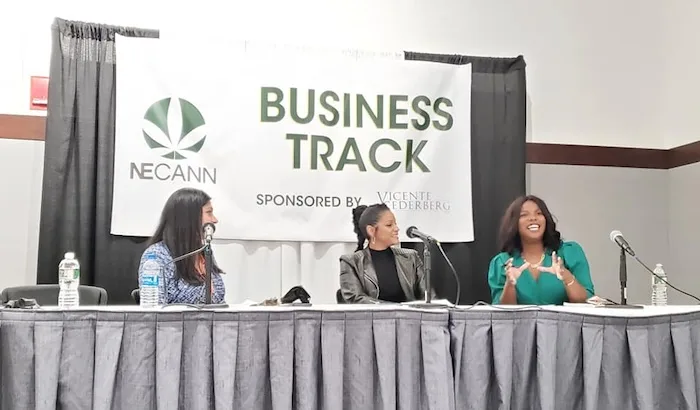
Right now, the only viable marijuana bill in Congress is a banking bill—how shameful is that?
Talking Joints Memo has been close to the team behind the New England Cannabis Convention since its inception in 2015, and are excited to be partnering with NECANN on a special glossy print magazine in honor of the 10-year anniversary in 2024. The publication, which will be free to Boston convention attendees on a first-come, first-served basis, will feature everything from photo galleries and highlights from the past decade to editorials, interviews, and columns like this one by former Mass cannabis regulator Shaleen Title.
My memory of the first New England Cannabis Convention feels sweet and quaint in hindsight, but it felt like a major step forward at the time. I had recently opened the Massachusetts branch of the first national marijuana law firm, and spent most of the weekend standing behind a table in the relatively small Boston venue. Throughout the convention, there was talk about how the state marijuana industry could be fairer and more equitable than other industries, and how federal legalization was on the horizon.
Ten years later, it looks like our optimism was mostly warranted. NECANN has grown to be one of the largest cannabis conventions in the world, and my old law firm sits in one of the tallest skyscrapers in Boston. And though there’s still room for improvement, we have a thriving, billion-dollar marijuana market that is indeed fairer and more equitable than many other industries.
And yet one thing hasn’t changed: we still haven’t federally legalized cannabis. Even worse, most people don’t seem to be very engaged in the process. When I ask people what model of federal legalization they support, I frequently get a shrug or a “just de-schedule it.” Most people seem to be fine ceding the details to whoever’s corporate lobbyists happen to be in Washington, DC.
Friends, it’s time for some tough love. About 70% of the US population, over 200 million Americans, support legalization, and most don’t need to care about the details. But if you are attending NECANN, if you are part of this community, you have to care about the details. And you have to talk to your federal elected officials about what you want marijuana legalization to look like. Because they are definitely hearing from Altria, Philip Morris, Uber, Amazon, and other lobbyists who are looking to replace our current system with a monopoly that would be dominated by one or two corporations that couldn’t care less about the plant or the people who use it.
Currently, federal lawmakers are mostly hearing from lobbyists who think the most urgent issue is profits. Instead of hearing that they need to work to free people who are locked up for marijuana-related offenses that are now legal, they only hear about banking. And taxes. And occasional lip service to equity, but only in the context that we need to protect banks and lower taxes. Right now, the only viable marijuana bill in Congress is a banking bill—how shameful is that?
These lobbyists’ priorities are completely backwards. Instead, we should be asking Congress for three things. First, free people, expunge records, and restore access to voting, housing, and food stamps to people who have lost their rights due to marijuana convictions. Second, pass a law that allows small and worker-owned businesses to sell marijuana across state lines before anyone else (see Parabola Center’s blueprint for this). And finally, establish anti-monopoly rules that will prevent another “Big” industry like Big Tobacco from exploiting all of us.
I believe that if anyone can make these changes, it’s those of us in Massachusetts who have been the pioneers of marijuana industry innovation for years. Our state program was built intentionally with a focus on equity and with strict limits to prevent corporate domination, and we have eight years of data showing that this model works and results in low prices for consumers.
Plus, many of our elected leaders are already at the forefront of the discussion on marijuana law reform which makes our jobs easier. Sen. Ed Markey has spoken out against big businesses that exploit the patchwork of state laws at the expense of communities hardest hit by the war on drugs. Congresswoman Ayanna Pressley was one of the first officials to call for cannabis equity, going back to her time as a Boston city councilor.
And while Sen. Elizabeth Warren makes weed jokes, she also has a deep understanding of the nuances of cannabis policy. A recent letter to the DEA that she co-wrote with colleagues said that descheduling is a “rare opportunity to shape the new cannabis industry from the ground up, designing a federal regulatory system untainted by the corporate capture that has influenced alcohol and tobacco regulations.”
These statements are a promising sign that our elected officials are willing to listen. Now it’s time for us to talk. The timing of the Biden administration’s rescheduling review and the constant touting of marijuana law changes—even before any changes have been made—demonstrate that this pre-election period is a rare opportunity when the federal government will actually listen. After decriminalization in 2008, medical protection in 2012, and legalization in 2016, I believe our community in Massachusetts is ready to lead the rest of the nation now.
To get involved, sign up for the Parabola Center’s mailing list. You can make a donation, join allies from across the nation for a pre-420 Day of Unity in Washington, DC, and save the date for our second annual Federal Cannabis Policy Crash Course July 13-14 in Providence, Rhode Island.

























